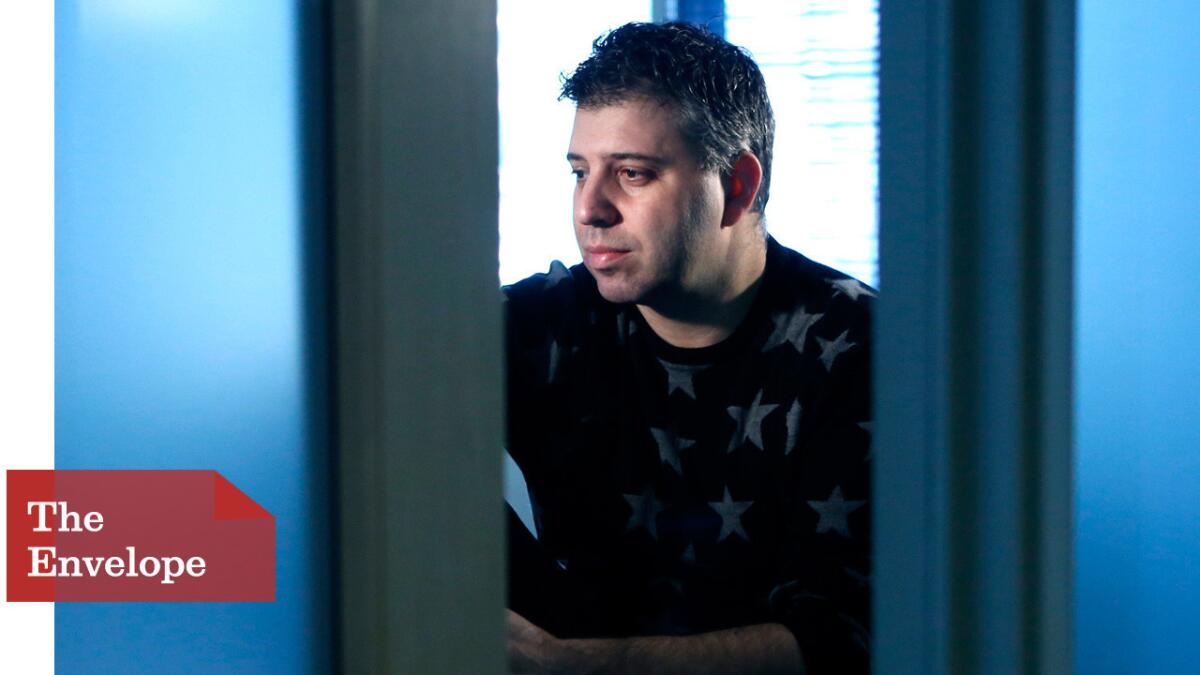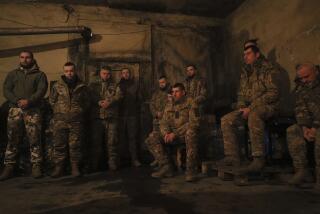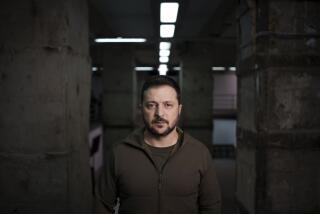The Envelope: Evgeny Afineevksy’s ‘Winter on Fire’ took him to the front line of Ukraine’s revolution

Evgeny Afineevsky, director of the Oscar nominated documentary feature, “Winter on Fire: Ukraine’s Fight for Freedom.”
In director Evgeny Afineevsky’s Oscar-nominated documentary “Winter on Fire,” the viewer is plunged into a singular cinematic experience: a revolutionary’s view of a spontaneous civil rights uprising that actually toppled a government. The riveting feature, which arrived in limited release in October and has been streaming on Netflix ever since, traces Ukraine’s burgeoning self-determination to integrate with Europe, beginning with peaceful student protests in 2013. But faced with unchecked brutality by special police called the Berkut — who used kidnapping, tear gas and snipers’ bullets to suppress fellow Ukrainians — demonstrations in Kiev’s Independence Square (known as Maidan) evolved into a spasm of nationalism. And a million citizens eventually mobilized against the regime of President Viktor Yanukovich to drive him into exile. Afineevsky (“Divorce: A Journey Through the Kids’ Eyes,” “Oy Vey! My Son is Gay!”) chronicled the conflict for 93 days over 2013-14 and returned with a case of secondary post-traumatic stress disorder as well as a broad outlook on the importance of unity.
You were born in the former USSR, immigrated to Israel and now live in the U.S. What compelled you to go to Kiev during these demonstrations?
One of my friends who produced “Divorce: A Journey Through the Kids’ Eyes” lives in Russia and was there in Maidan when it all started. This revolution was unusual. It was self-organized. Young people with the help of social media getting together and trying to hoist themselves into this space to get the attention of the government. The first day, he called me and said, “You should come. We should try to make a movie.”
I never was expecting such drama. But when I saw what was going on, I thought, “I can’t leave them.”
Oscars 2016: Full Coverage | Complete list | Snubs, surprises and reactions | Top nominee photos
Tell me about the risks you and your crew of 28 cameramen faced.
[Police] shot at us. Some of our friends were horribly beaten on the 1st of December. They allowed the cameras to get very close, then most of the people beaten at first were journalists. The tear gas and police batons; a horrible thing. The cold water they sprayed on us. I have a scar from a splinter that came from the [stun] grenades. Some people who have watched this film are calling it the “‘Les Mis’ of our time.” It is “Les Mis” — the barricades, the kids. But it’s our days. And it’s much more horrible.
What do you hope people will take away from watching this movie?
What I felt obligated to bring to the world is the importance of unity. There in Maidan, all social classes, all ages, all religions were all brought together — rich ladies in high heels got out of their Mercedes to cut sandwiches in the square. Jews, Christians, Muslims stood together without saying, “You need to believe in my God!” Priests standing on the front line before police. They were risking their lives. I think people can learn from this unity.
What does an Oscar nomination mean to you?
It’s recognition. Not for me, it’s for them. I’m telling the story through the eyes of the people who came to this square, who stood under these bullets, who stood through the cold water and gas the Berkut sprayed us with. These people came with their beliefs: in democracy and freedom. As much as it was dangerous, I was surrounded by them like a family. I only had my emotional breakdown later: I was diagnosed with secondary PTSD. I met friends and then I lost them. And then I saw footage of them being killed. An Oscar can give more importance to their story. And more people can learn.
So the nomination is already a win.
Netflix brought this movie to 130 countries. I’m getting Facebook messages from all over the world, from people telling me it changed their lives. If it did, it’s already a huge achievement. For a lot of Americans, I hope it’s an eye-opener about real freedom and democracy.
More to Read
From the Oscars to the Emmys.
Get the Envelope newsletter for exclusive awards season coverage, behind-the-scenes stories from the Envelope podcast and columnist Glenn Whipp’s must-read analysis.
You may occasionally receive promotional content from the Los Angeles Times.







